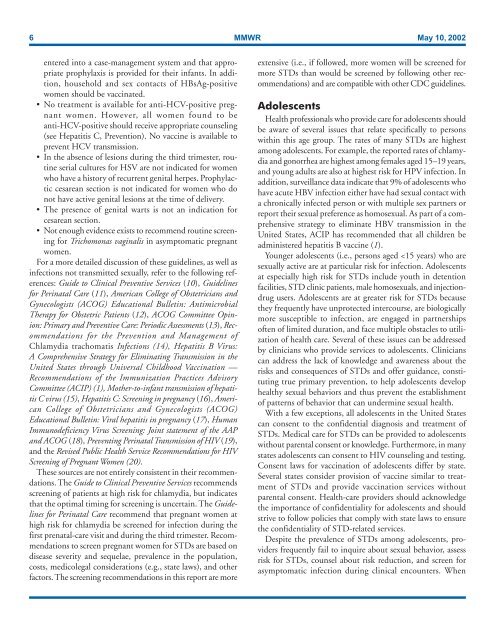You also want an ePaper? Increase the reach of your titles
YUMPU automatically turns print PDFs into web optimized ePapers that Google loves.
6 MMWR May 10, 2002<br />
entered into a case-management system and that appropriate<br />
prophylaxis is provided for their infants. In addition,<br />
household and sex contacts of HBsAg-positive<br />
women should be vaccinated.<br />
No treatment is available for anti-HCV-positive pregnant<br />
women. However, all women found to be<br />
anti-HCV-positive should receive appropriate counseling<br />
(see Hepatitis C, Prevention). No vaccine is available to<br />
prevent HCV transmission.<br />
In the absence of lesions during the third trimester, routine<br />
serial cultures for HSV are not indicated for women<br />
who have a history of recurrent genital herpes. Prophylactic<br />
cesarean section is not indicated for women who do<br />
not have active genital lesions at the time of delivery.<br />
The presence of genital warts is not an indication for<br />
cesarean section.<br />
Not enough evidence exists to recommend routine screening<br />
for Trichomonas vaginalis in asymptomatic pregnant<br />
women.<br />
For a more detailed discussion of these guidelines, as well as<br />
infections not transmitted sexually, refer to the following references:<br />
Guide to Clinical Preventive Services (10), Guidelines<br />
for Perinatal Care (11), American College of Obstetricians and<br />
Gynecologists (ACOG) Educational Bulletin: Antimicrobial<br />
Therapy for Obstetric Patients (12), ACOG Committee Opinion:<br />
Primary and Preventive Care: Periodic Assessments (13), Recommendations<br />
for the Prevention and Management of<br />
Chlamydia trachomatis Infections (14), Hepatitis B Virus:<br />
A Comprehensive Strategy for Eliminating Transmission in the<br />
United States through Universal Childhood Vaccination —<br />
Recommendations of the Immunization Practices Advisory<br />
Committee (ACIP) (1), Mother-to-infant transmission of hepatitis<br />
C virus (15), Hepatitis C: Screening in pregnancy (16), American<br />
College of Obstetricians and Gynecologists (ACOG)<br />
Educational Bulletin: Viral hepatitis in pregnancy (17), Human<br />
Immunodeficiency Virus Screening: Joint statement of the AAP<br />
and ACOG (18), Preventing Perinatal Transmission of HIV (19),<br />
and the Revised Public Health Service Recommendations for HIV<br />
Screening of Pregnant Women (20).<br />
These sources are not entirely consistent in their recommendations.<br />
The Guide to Clinical Preventive Services recommends<br />
screening of patients at high risk for chlamydia, but indicates<br />
that the optimal timing for screening is uncertain. The Guidelines<br />
for Perinatal Care recommend that pregnant women at<br />
high risk for chlamydia be screened for infection during the<br />
first prenatal-care visit and during the third trimester. Recommendations<br />
to screen pregnant women for STDs are based on<br />
disease severity and sequelae, prevalence in the population,<br />
costs, medicolegal considerations (e.g., state laws), and other<br />
factors. The screening recommendations in this report are more<br />
extensive (i.e., if followed, more women will be screened for<br />
more STDs than would be screened by following other recommendations)<br />
and are compatible with other CDC guidelines.<br />
Adolescents<br />
Health professionals who provide care for adolescents should<br />
be aware of several issues that relate specifically to persons<br />
within this age group. The rates of many STDs are highest<br />
among adolescents. For example, the reported rates of chlamydia<br />
and gonorrhea are highest among females aged 15–19 years,<br />
and young adults are also at highest risk for HPV infection. In<br />
addition, surveillance data indicate that 9% of adolescents who<br />
have acute HBV infection either have had sexual contact with<br />
a chronically infected person or with multiple sex partners or<br />
report their sexual preference as homosexual. As part of a comprehensive<br />
strategy to eliminate HBV transmission in the<br />
United States, ACIP has recommended that all children be<br />
administered hepatitis B vaccine (1).<br />
Younger adolescents (i.e., persons aged


